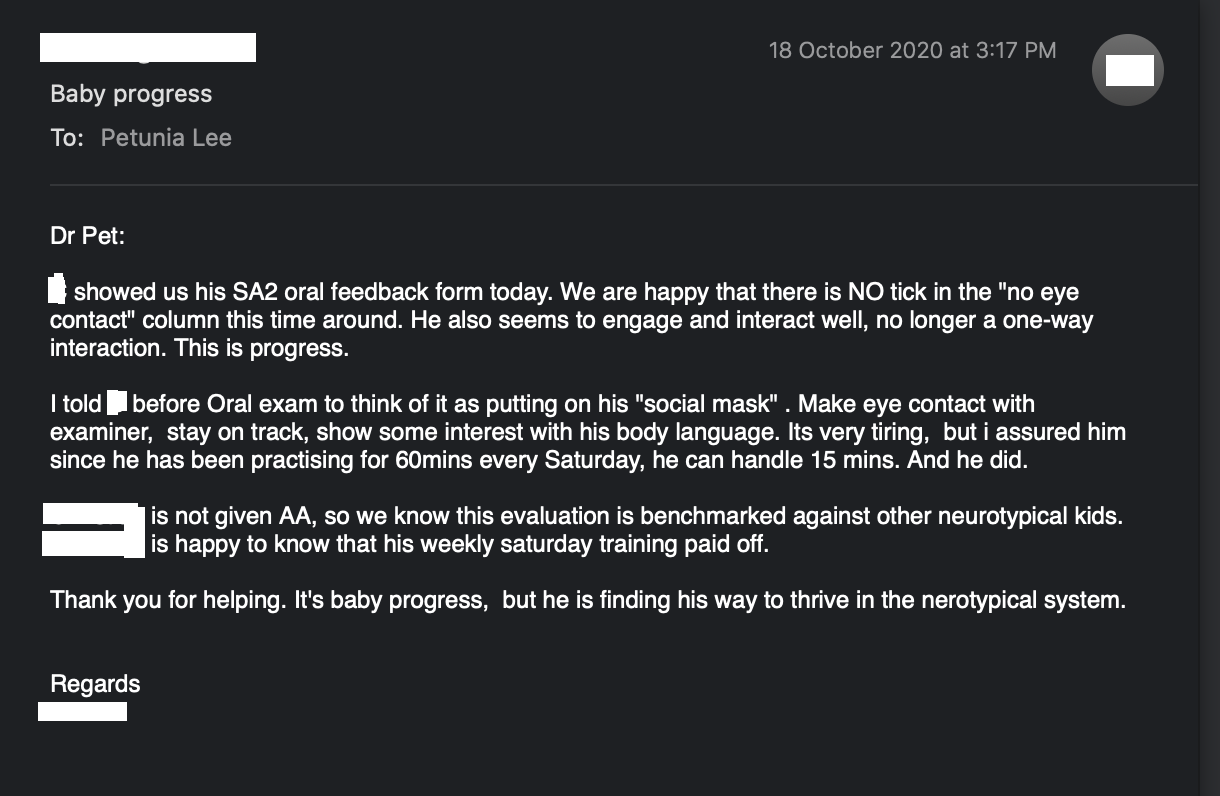|
This child obtained his Asperger's diagnosis in toddlerhood. For years, he had been in and out of therapy. The therapy did work somewhat but when he came to me, he was still an unhappy social reject, prone to meltdowns. His parents tried their best to cope but family life was fraught with angst and frustration.
This child got into the GEP. The parents opted to put him there in the hope that he would find his own tribe and achieve some social success. He did not. GEP teachers complained about him often. The Math teacher complained that he was not paying attention, but he managed to score 98/100 in Mathematics in a GEP math exam. At this point, the teacher would be forgiven for thinking him arrogant (i.e., I am so smart I don't have to pay attention.) In actual fact, he was paying rapt attention. he just could not bear to look at the teacher. Is all. The parents were gung ho. Like me, they wanted their child to learn to integrate the neurotypical world, if necessary. So, the parents did NOT tell the GEP that their child had obtained a formal diagnosis of Asperger's. I worked in close collaboration with the parents to teach these social integration skills. He is in the end of P4. We are there. We have achieved what most parents of autistic children think is impossible. In P5 and P6, I will teach him to lead. By secondary school, he will be able to do all the social things everyone else can do (when necessary). However, there will things that he can do easily and excel at, which normal people will find extremely difficult. Thus, he will become sought after talent everywhere he goes. Autistic children can do excellently well things normal children cannot do well. We only have to teach them to do things that come naturally to others. Then, they will soar into their potential. Please note that the mother used the word "thrive." That is the goal: the autistic child must THRIVE, not merely survive. Actually, I don't think it is baby progress. I think it is HUGE progress. This parent is quite demanding hor... :-) If your child is neurotypical, we can go straight into leadership training.
0 Comments
In this post, I want to speak up for gifted children (not parents of gifted children). Many gifted children come through my centre. The issue is always the same. He/she is not maximising his/her potential. He/she can do better if he/she were motivated.
When I dig into the child's psyche, I find one huge obstacle to motivation (and therefore, Lifetime Achievement): The Fear of Failure. When the children are labelled "Gifted," 8 things happen. (1) Parents feel proud. (2) Grandparents feel proud. (3) Siblings feel envy. (4) Cousins feel envy. (5) Aunts and uncles all feel envy. (6) Parents' friends feel envy. (7) Grandparents' friends feel envy. (8) Complete strangers feel envy. Of course, no one is going to tell you that they feel envious. Why would they embarrass themselves this way? On the surface, they are all going to congratulate you and tell you how happy they are for you. However, when your gifted child fails at something, or loses at something, this envy leaks out in comments like, "Huh? Gifted leh? How come you lost/failed?" It is not too long before the gifted child feels the pressure to never fail/lose. There are 2 ways to avoid losing/failing: (1) To avoid anything that looks too hard. (2) To actually win/succeed. The Gifted Label is a heavy one for young ones to bear. It represents more work and harder work, less play. It represents pressure. Parents and grandparents get bragging rights. In the long run, these bragging rights are useless to the child. Whilst parents and grandparents bask in the prestige of the label, the child has to live up to it. That is a huge burden for a child to bear. Thus it is that many a gifted child look at me with despondent and unhappy eyes, saying, "School is useless." The damage goes beyond a mere child's unhappiness. The label is so crushing that gifted kids avoid challenge. Come on. If you knew that people would point fingers at you and say, "Huh? You are gifted? How come you cannot do this?", you too would avoid challenge, no? The irony is this: if the gifted child simply relaxes and enjoys learning, he would naturally take on challenge after challenge... and ace them. However, in avoiding challenge, he/she saves himself from failing, but also denies himself all the future spectacular successes built on the corpses of today's failures. See HERE. The Son would not have gotten into Cambridge if he had not failed again and again and again. Someone I know, who attained the pinnacle of his organisation before retiring to travel the world, told me that he once dared not go home because he knew he would be caned for less than stellar exam results. He lived in Chinatown, and his family scoured the streets for him when night fell. You could say that treatment worked because this man grew up into someone quite successful. Yet, these methods no longer work because the school system has become so demanding that terrorising your child is a guarantee of making that child fail in school.
You can scare a child into excelling at rote-learning exams. Thinking exams cannot be aced by fear. I was caned too. Sometimes, the caning drew blood. In some ways, this explains why I seem to understand children. I have never forgotten what it was like to be: - trapped - coerced - beaten - scolded - misunderstood This explains how I learnt to be kind and gentle with people weaker than I am: children, cleaners, road sweepers, garbage collectors, wait staff, delivery men, hawker stall assistants/workers. I learnt long ago that people mistreat the weak because they can. I did not want to be like them. Like most people, I did not think nagging was a very bad thing. It was only recently that I realised that nagging was a form of aggression. It is a micro-aggression. It does not qualify as abuse, like what I detailed above. Yet, it does do damage to the child over weeks and months and years because it is incessant, like a small grain of sand in your shoe as you walk for 100km. Case Study 1 This child's parents came to me ostensibly to get help to motivate the child to do HW. Once this child had warmed up to me, he miserably confided in me, "I hate HW. I hate school." In his eyes, there was a look of desperation, like a soul trapped in agony. When I mapped the family dynamics, more things surfaced. The child was violent at home. It was not just HW. It was anger management. In my class, apart from the 2 first lessons, I saw no anger management issues. Once the child got used to the class environment, he left his preconceived notions behind and became beyond calm. He was unusually reflective and unusually considerate of others. When I described their child in the weekly class report, the parents did not recognise their child. They concluded that their child never shows his ugly side to strangers. Actually, it was simply that there was a key stressor at home which did not appear in my class. Dr. Pet does not nag. She acts. This child's mama nagged nonstop. She used a whining tone to remind her child of this and that. Out of her mouth came a constant stream of feedback for improvement and precious little praise. The situation was particularly acute during HW sessions. The more she nagged, the more he hated HW, the more he resisted, the more tantrums he threw. Nagging hardens the child's stubbornness in the same way a kitchen blowtorch hardens the sugar crystals on top of the crème brûlée into a hard caramel. If you cannot stop nagging, please get in touch for parent coaching. Case Study 2 This child was sneaky. He would do what he was not supposed to do whenever his parents were not looking. Barred from phone games, he secretly played for hours by setting up a brilliant subterfuge. So, he was an extremely intelligent child. If you want someone who will do the right thing when no one is looking, this was NOT the child. We feared. Liew Mun Leong's son, Karl Liew, also thought no one was looking. Pastor Kong Hee also thought no one was looking. So, we feared. I found out that his gentle mama nagged a lot. This was not a violent family. They did not believe in caning children. They tried their best to be kind and loving to their children. Nagging did not appear to be abusive. Nagging is NOT abusive. Yet, it does damage to the child. This child responded in another way. He simply went undercover to do what his Mama nagged him NOT to do. He simply stalled and dawdled and dragged his feet, conveniently forgetting to do his work, or simply stating it was no point to do HW. If you cannot stop nagging, please get in touch for parent coaching. Nagging and PTSD In some young adults, a certain tone can make them raise their psychological defences up high. Speak with them in that tone and it does not matter how reasonable your demand is, they will not acquiesce. They will stubbornly refuse to comply. They had naggy parents. Nagging hardens the child's stubbornness in the same way a kitchen blowtorch hardens the sugar crystals on top of the crème brûlée into a hard caramel. That naggy tone triggers their PTSD. All their psychological defences go up. Once the Ministry of Education removes the t-score, secondary schools will screen students differently. The importance of EQ, influencing skills and leadership will come to the fore. Even before setting up The Collaboration Corner, Dr. Pet had been quietly teaching her students EQ, influencing and leadership. This is increasingly paying off during the DSA selections.
This child did not take part in Olympiads. She loves to draw, and is crazy about marine animals of all sorts. She started off quiet, dreamy and did not make eye contact. After the first lesson, I complained that she was not paying attention. She later became one of my strongest leaders, and most enthusiastic students. SST has 2 parts to its selection process: - academic testing - team interview (1) a team of students work at a team task (2) a team of students discuss a topic Low EQ kids who cannot work in teams fail the team interview. |
Author
Petunia Lee, Ph.D Archives
January 2022
Categories
Find out more about our classes!
|




